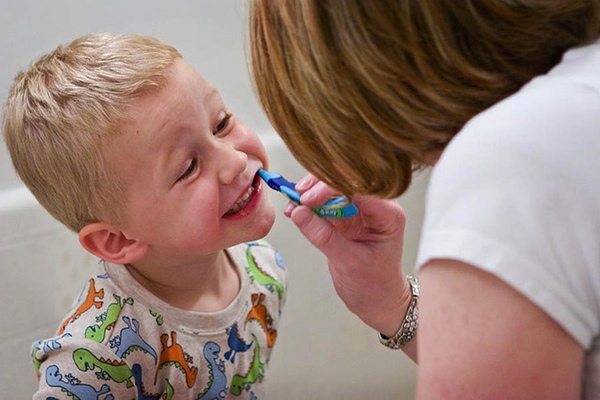Parents should make tooth-brushing fun for kids to avoid scary trips to the dentist. Photograph by Flickr user makelessnoise.
This week, many parents are in a frenzy after reading a New York Times article that reported the rise of preschoolers undergoing surgery to treat out-of-control cavities and tooth decay.
The article stated that in recent years, dentists nationwide have reported treating preschoolers at all income levels with six to ten cavities or more. The news hardly made local pediatric dentist Dr. Angela Austin raise an eyebrow, but she’s glad the issue is getting coverage.
“It’s a surprise to a lot of the public, but it’s no surprise for dentists,” she says. “I’ve seen this happening for the past eight years I’ve been in practice.”
During her residency, Austin recalls setting aside every Thursday and Friday for at least four surgeries for patients. “Usually, the kids were four and under,” she says, “and sometimes as young as one.”
Austin says her youngest patient was 18 months old, while her worst case involved a child who had to undergo surgery for all 20 teeth. “It’s so heartbreaking,” she says, “and it’s usually because parents just don’t know the importance of primary teeth care.”
First-time parents typically fall into this category, she explains. “They’ll say, ‘Oh, they’re baby teeth and are going to fall out.’ But no, those teeth will be in their mouth until they’re 12. So that’s ten or so years of living with decay, infections, or pain.”
Many parents are also not aware of new recommendations that come from the American Academy of Pediatrics. Until just a few years ago, the academy recommended parents not bring children to the dentist until age three. But when pediatric dentists started seeing younger and younger kids coming in with cavities, the recommendation changed to age one.
Another factor, though Austin says it’s not a huge risk, is that these days more parents give their children bottled water versus tap. Fluoride aids in preventing tooth decay, which is why toothpaste typically contains 1,000 parts per million. Tap water contains minuscule amounts, but it can still have a slight impact on children’s dental health, Austin says.
Research has also proven that parents and caregivers can transfer tooth decay and cavities to their children via saliva. So parents should be wary of tasting their kids’ food before serving it or cleaning pacifiers in their own mouths. In the long run, children are likely to end up with poor dental health as adults if their mothers have poor oral health.
Still, genetics is not an excuse to not teach your child proper dental hygiene, Austin says. “A lot of times, kids tell their parents they don’t want to brush their teeth, so the parents give up and say, ‘Okay, fine.’ It comes down to good parenting.”
Austin recommends parents do the following to avoid any scary trips to the oral surgeon:
Bring your child to the dentist by age one.
At this age, Austin says most pediatric dentists will do a quick exam; they rarely go through the same cleaning process as older patients. “We make it fun and fast. It desensitizes them.” This can make the prospect less intimidating later.
Make tooth-brushing fun.
Lots of kids get excited to use battery-powered brushes or those that are character-themed. Austin recommends the Sonicare electronic toothbrush, which is equipped with a timer. Parents who have an iPhone or iPad can download the kid-friendly Teeth Timer app that plays songs while kids brush their teeth for two minutes.
Brush together and set an example.
“One thing we want kids to learn is to spit the toothpaste out, versus swallowing,” Austin says. Parents can be a model for their children by demonstrating the proper way to do this.
Use the right toothpaste.
Until children turn two or learn to properly spit, Austin recommends using nonfluoride toothpaste, which is safer to swallow. After that age, switch to fluoride toothpaste and monitor kids as they brush to make sure they’re not sucking on the toothbrush or swallowing.
Avoid giving children juice boxes and bottles before bed.
“A lot of times the problem is juice, not candy,” Austin says. “It stays on their teeth all night, and not a lot of saliva is being produced. That’s why most cavities are formed at night: because there are no bacterial-washing properties.”



















